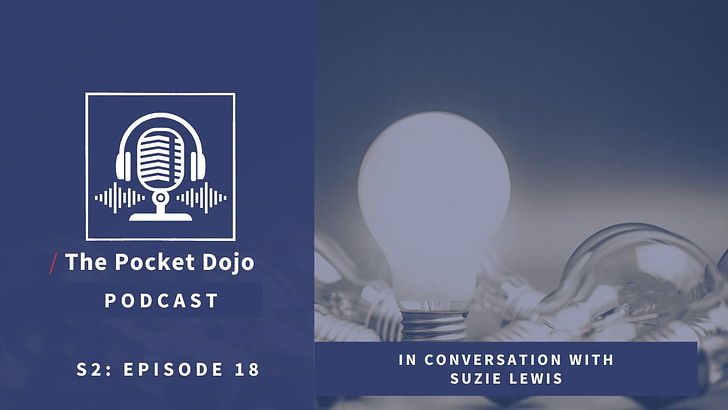The Pocket Dojo podcast #Ep 18 - In conversation with Suzie Lewis
Make it real, do the work, leverage the tech
In this week’s episode of the Pocket Dojo podcast, I’m talking with leadership and digital transformation practitioner, Suzie Lewis. Suzie and I first met some years ago now in a workshop I was running for an organisational client where she was a leader at the time. I’ve witnessed her experience her own significant transformation and how she is now flourishing as the founder and managing director of Transform for Value, helping organisations re-centre for success with systems designed for collaboration and inclusion.
Our conversation revolves around how regenerative leadership and organisational development can foster innovation and collaboration. Regenerative leadership goes beyond traditional practice to explore the organisational system and understand that challenges are often entrenched within the system. In other words, they cannot be addressed through linear problem-solving approaches but by discovering how to create conditions for the system to find its way back to balance and health. Regenerating our organisations means redesigning them based on living systems principles and weaving cultures where everyone can flourish. The emphasis is on the growth of knowledge, wellbeing, inclusion, belonging, trust, creativity and wisdom, not just financially. Ironically, it also reduces costs.
We delve into key elements of regenerative leadership practice and tips about concrete things to do:
Fostering self-awareness
It is really important that as leaders, we learn to make reflection a key element of daily life, so that we can understand our own reactions and responses to transformation. How we think, feel and therefore act are crucial to managing the complexity of transformation and sowing the seeds of its success. We would be wise to get clear about our strengths, what we find difficult and what triggers us into reacting rather than creatively responding to challenges, so that together we can create inclusive, collaborative working environments.
Tips:
Set aside time for self-reflection to understand your thoughts, feelings, and reactions.
Ask for feedback from your team members and colleagues to understand the impact your leadership style has on others and model vulnerability.
Find a mindfulness practice (e.g. meditation, journaling, spending time in nature) to help you become more self-aware.
Understanding the context
Another essential element is to make adequate sense of the context we find ourselves in so that we understand the specific challenges and dynamics of our organisation much better and how they arise in the system. This means not just relying on sector or economic trends to inform decisions and running to find solutions to the problems we face. Good sense-making is critical so that we don’t inadvertently create more complexity and waste valuable resources.
Tips:
Make sense of the reality you face across functions and organisational levels to identify systemic challenges, opportunities and constraints.
Create an inclusive environment where ideas can be shared freely and safely, and feedback becomes an organisational habit.
Weave an organisational culture that is honest and transparent so that trust can grow and be maintained across functions and organisational levels which will often have different priorities and concerns.
Photo credit: Joseph Wackerhausen 2008
Making regeneration real
We need to define what it means to regenerate in our particular context, beginning from our pain points and projects, so that it becomes part of our organisational DNA, not just the latest leadership fad. Regeneration doesn’t ask us to reinvent everything from scratch, rather to build on our existing strengths to create a more sustainable, resilient organisational culture.
Tips:
Start with small steps which can lead to significant shifts in time.
Develop emotional and relational intelligence so that employees can find their own part in developing a regenerative culture.
Focus on enhancing open dialogue and feedback across the organisation.
Leveraging the technology
We all know now that technology can help us to collaborate more effectively and streamline processes. When we get that right, it frees up our time and energy to focus on the human aspects of working in organisations.
Tips:
Keep up-to-date with advances in technology that can be useful for your organisation and their impacts on the business.
Ensure your technology enhances human connection and interaction, and doesn’t replace it.
Experiment with new technologies and adapt them to your organisational context.
Photo credit: prianka 2019
Learning as an organisation
We often believe that working in an organisation principally requires us to get things done as quickly, cheaply and effectively as possibly, usually in that order. However, in a world that is changing fast, not least thanks to technological advances we don’t yet understand or know well, it is paramount that we also learn in our organisations. And transform, not just adapt them, in response to that changing world.
Tips:
Reframe failure as a chance to learn and grow in order to innovate and transform, instead of a setback.
Build support networks within and outside the organisation for guidance, encouragement and challenging group-thinking.
Set realistic, achievable goals and celebrate small wins that strengthen energy, confidence and momentum for change.
‘You can stop it (regenerative practice) from becoming a buzzword by constantly doing three things: one, giving it meaning; two, making it real; and three, constantly bringing people back down to earth on it.’
Suzie Lewis
Chapters:
00:00 Introduction
01:38 Meet Suzie Lewis
05:16 Importance of Regenerative Leadership
09:43 Defining Regenerative Practices
16:42 The Human Dimension of Leadership
28:32 Navigating the Future of AI
38:57 Non-Negotiable Regenerative Practice
In essence then, Suzie sees regenerative leadership practice as prioritising self-awareness, seeking a better understanding of the context in which we operate, and being open to learning. In embracing this kind of practice as leaders, we can inspire others to do the same. It becomes easier to foster open communication and leverage technology to address internal and systemic challenges to create a more resilient and adaptable organisation. When leaders adopt regenerative leadership more widely, perhaps we will have a fairer and more equitable society.
To find out more about Suzie’s work, click here or connect with her here.
You can find out more about my work here:
📊 https://www.learningthroughdoing.com
And my co-host Paul’s work here:
📎 https://linktr.ee/theelevatepartnership
We hope you enjoyed this episode of the Pocket Dojo podcast.
Thanks for watching!





